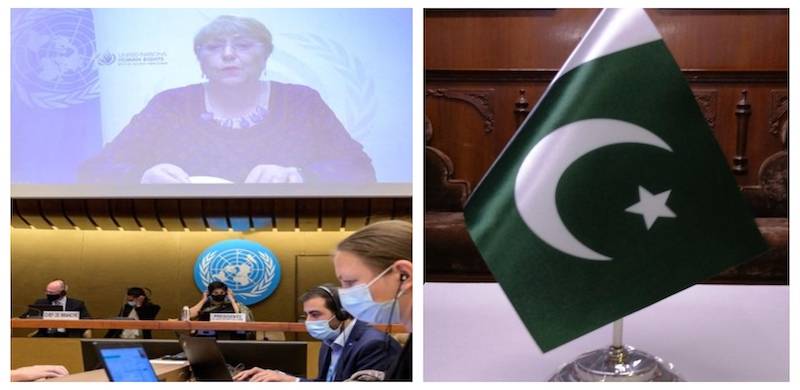
A resolution tabled by Pakistan establishing an ongoing commission of inquiry to investigate the reports of human rights violations and abuses in Palestine has been adopted by the United Nations Human Rights Council (UNHRC).
https://twitter.com/UN_HRC/status/1397954381732106246?s=20
Pakistan submitted the resolution on behalf of the Organisation of Islamic Cooperation (OIC). The resolution was adopted with 24 members in favour and 9 voting against it. 14 countries abstained from voting.
United Kingdom and Germany are among countries who opposed the resolution. India abstained from voting.
According to the resolution, the UNHRC, "decides to urgently establish an ongoing independent, international commission of inquiry, to be appointed by the President of the Human Rights Council, to investigate, in the Occupied Palestinian Territory, including East Jerusalem, and in Israel, all alleged violations of international humanitarian law and all alleged violations and abuses of international human rights law leading up to and since 13 April 2021, and all underlying root causes of recurrent tensions, instability and protraction of conflict, including systematic discrimination and repression based on national, ethnic, racial or religious identity.."
It further stated that the commission of inquiry shall:
https://twitter.com/UN_HRC/status/1397954381732106246?s=20
Pakistan submitted the resolution on behalf of the Organisation of Islamic Cooperation (OIC). The resolution was adopted with 24 members in favour and 9 voting against it. 14 countries abstained from voting.
United Kingdom and Germany are among countries who opposed the resolution. India abstained from voting.
According to the resolution, the UNHRC, "decides to urgently establish an ongoing independent, international commission of inquiry, to be appointed by the President of the Human Rights Council, to investigate, in the Occupied Palestinian Territory, including East Jerusalem, and in Israel, all alleged violations of international humanitarian law and all alleged violations and abuses of international human rights law leading up to and since 13 April 2021, and all underlying root causes of recurrent tensions, instability and protraction of conflict, including systematic discrimination and repression based on national, ethnic, racial or religious identity.."
It further stated that the commission of inquiry shall:
- Establish the facts and circumstances that may amount to such violations and abuses and of the crimes perpetrated;
- Collect, consolidate, and analyse evidence of such violations and abuses and of the crimes perpetrated, and systematically record and preserve all information, documentation and evidence, including interviews, witness testimony and forensic material, in accordance with international law standards, in order to maximise the possibility of its admissibility in legal proceedings;
- Have the capacity to document and verify relevant information and evidence, including through field engagement and by cooperating with judicial and other entities, as appropriate;
- Identify, where possible, those responsible, with a view to ensuring that the perpetrators of violations are held accountable;
- Identify patterns of violations over time by analysing the similarities in findings and recommendations with and of previous UN fact-finding missions and commissions of inquiry on the situation;
- Make recommendations, in particular on accountability measures, all with a view to avoiding and ending impunity and ensuring legal accountability, including individual criminal and command responsibility, for such violations, and justice for victims;
- Provide recommendations on measures to be taken by third States to ensure respect for international humanitarian law in the Occupied Palestinian Territory, including East Jerusalem, in accordance with article 1 common to the Geneva Conventions, and in fulfilment of their obligations under articles 146, 147 and 148 of the said Convention, including by ensuring that they do not aid or assist in the commission of internationally wrongful acts;
- Provide recommendations on practical measures that can be taken in follow-up of the report of the Secretary-General to the General Assembly, A/ES-10/794 of 14 August 2018, pursuant to General Assembly resolution ES-10/20 of 18 June 2018;
- Report on its main activities on an annual basis to the Human Rights Council under agenda item 2 as of its 50th session and to the General Assembly as of its 77th session;
- Calls upon all relevant parties to cooperate fully with the commission of inquiry and facilitate its access;
- Calls upon all States, and encourages civil society, the media, and other relevant stakeholders to cooperate fully with the commission of inquiry to effectively fulfil its mandate and, in particular, to provide it with any information and documentation they may possess or come to possess, as well as any other forms of assistance pertaining to their respective mandates;
